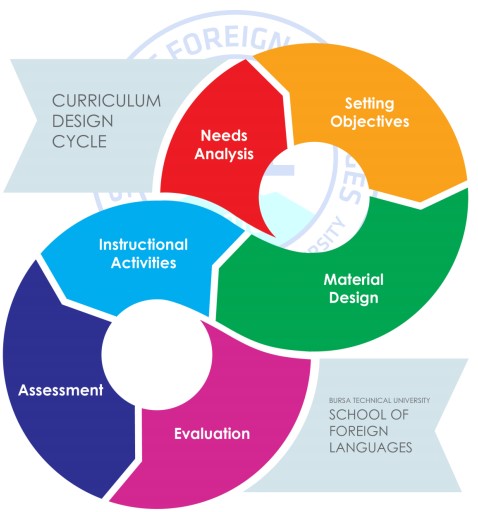
Curriculum Policy
The curriculum of the English Preparatory Program at Bursa Technical University School of Foreign Languages (BTU SFL) is meticulously designed to align with the institution's vision, mission, and objectives. As a key pillar of our educational approach, the curriculum is crafted with the goal of providing students with the necessary language skills to support their academic success in English. This curriculum is based on the Common European Framework of Reference for Languages (CEFR), ensuring that all course content, instructional strategies, and assessment methods are aligned with internationally recognized standards.
BTU SFL adopts a dynamic curriculum design cycle, which involves continuous evaluation and modification. The cycle includes the steps of needs analysis, setting clear and realistic learning objectives, designing materials, conducting instructional activities, and performing assessments. This cyclical approach allows for regular updates and refinements based on ongoing feedback from students, instructors, and external stakeholders. As a result, the curriculum remains relevant, adaptable, and responsive to the evolving needs of both students and the wider academic community.
Learning Objectives Policy
The primary aim of the English Preparatory Program at BTU SFL is to provide high-quality language education that prepares students for their academic studies in English. Learning objectives are developed through a comprehensive needs analysis conducted regularly by the SFL management team to gather insights from students, faculty, and external sources. These findings directly inform the curriculum development process, ensuring that the objectives and outcomes of each level of instruction align with the identified needs.
The curriculum of the English preparatory class aims to provide quality language education to prepare its students for their academic studies in English. In line with these aims, the needs of the students are determined through intensive and on-going research initiatives, which are then applied for the improvement of educational program. The learning objectives and outcomes for each level of instruction are determined based on the findings of the needs analysis study conducted at the SFL, and course material are designed to be compatible with the objectives and outcomes of each level. At the end of each academic year, the SFL management conducts meetings with the Coordinators to discuss the fulfillment of these objectives and outcomes.
Teaching Policy
In recognition of the importance of learner autonomy, BTU SFL encourages students to take an active role in their language learning journey. Students are provided with access to a range of online resources and are encouraged to utilize the library’s reading materials. These resources support self-directed learning, allowing students to further develop their language skills outside of the classroom environment.
BTU SFL embraces an integrated skills approach to language teaching, which emphasizes communication as the cornerstone of language learning. In alignment with the SFL’s mission, instructors are required to conduct all classes in English, creating an immersive learning environment that maximizes student exposure to the language. This approach reflects the importance of communication in the learning process and aligns with the goal of fostering students' language proficiency across all skill areas—speaking, listening, reading, and writing.
Assessment Policy
The assessment policy at BTU SFL is integral to ensuring that the learning objectives of the curriculum are effectively met. Assessment activities are designed to align closely with instructional activities and course content, ensuring that students’ progress is accurately evaluated. The Testing Office plays a central role in the development and implementation of assessment strategies, ensuring that assessments are robust, fair, and reflective of the learning objectives.
Assessments at BTU SFL are not only used to evaluate student performance but also serve as a tool for enhancing the curriculum. Feedback from assessments informs adjustments in instructional activities and course materials, creating a continuous cycle of improvement. The SFL places a strong emphasis on formative assessments, which are integral to providing ongoing feedback and promoting student learning. This emphasis ensures that students are consistently engaged with their progress and any gaps in knowledge or skill are addressed in a timely manner.
By fostering a comprehensive approach to curriculum development, teaching, and assessment, BTU SFL ensures that students receive a high-quality education that prepares them to succeed in their academic and professional endeavors, while maintaining a commitment to the values of inclusivity, sustainability, and innovation in education.

